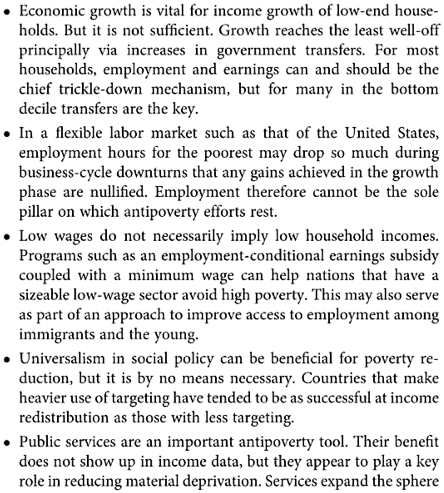The article is full of cool facts, such as that the command sign (next to the spacebar on a mac) is taken from Swedish maps indicating a castle seen from above! Basically she did what Otto Neurath wanted to do with his isotypes, really well. I think pictorial communication is really cool. Also, here is a video from 1968 of the first ever (I think?) graphical user interface with a mouse.
Friday 25 November 2011
The person who designed mac icons
Blues + puddings
=
Nancy Sinatra – Sweet Georgia Brown
John Martyn – The Easy Blues
Nina Simone – I Want A Little Sugar In My Bowl - 1993 Remastered
Louis Armstrong – Jelly Roll Blues
Humphrey Lyttleton – Cake Walkin' Babies
John Brim – Ice Cream Man
Jerry Lee Lewis – Milkshake Madamoiselle
The Beach Boys – Wild Honey
Wednesday 23 November 2011
Tuesday 22 November 2011
Progress for the Poor
via Andrew Gelman, here are the main points from a book about how to reduce poverty using government policy:
Each point has a separate detailed quantitative analysis backing it up. It sort of makes you wonder what other social scientists are doing with their time.
Flicking through on google books, I found this graph about unionisation especially suggestive and surprising:
Apparently the ones that haven't fallen are those where unemployment insurance is tied to union membership: what a good idea! I wonder if Ian Duncan-Smith will adopt it?
Also interesting:
"Despite the fall in union membership, in many countries collective bargaining arrangements have continued to keep the floor of the wage distribution relatively high. That owes to "extension practices": by agreement between union and employer confederations (and nations) or due to government mandate (France), union management wage settlements carry over to many firms and workers that are not unionised. In a number of countries the share of the workforce whose wages are determined by collective bargaining is much larger than the share of workers who are union members."
UPDATE: the author, Lane Kenworthy, has a blog!
Sunday 20 November 2011
Thank you, sergeant.
Forgot how good the Third Man is. Here is the rest if you can deal with not watching the very start. British films from the 40s-50s are so wonderful: I think what they have in common is that none of them really have heroes.
Here are some others, all of which I promise are worth your time:
A Canturbury Tale
The Fallen Idol
The Red Shoes
Kind Hearts and Coronets
Oliver Twist
A Matter of Life and Death
Brighton Rock
Tuesday 8 November 2011
Toughness
In my opinion it is the most beautiful personality trait:
Also isn't the commentary fantastic?
Also isn't the commentary fantastic?
Friday 4 November 2011
Never Mind the Bollocks...
... Here's an account of Otto Neurath's correspondence with Hayek about the relative merits of social engineering and free markets.
If you are at all interested in politics, you have probably thought about this question in some form or other, and this version really gets to the heart of the matter in my opinion.
All of Neurath's opinions about politics (and some about science) can be found here.
He was not only a fantastic and original philosopher, economist and world-improver, but also articulated really clearly loads of what I think are my (possibly others' as well?) intuitive opinions. For example, he thought that science, thought really great, isn't really different in kind from other day to day activities, that predicting things is hard and that it is silly to try to measure welfare with money.
Neurath also invented the weird 'isotype' pictures that you sometimes see in European airports and maps as a way to democratise access to statistical information.
Here are some slightly Humey words of wisdom:
I even think that many people did not resist the gradual growth of modern horror, because they did not feel much abhorrence of past terrors and of terrors in countries far away, on the contrary, they had learned to call terrible periods, terrible politicians and the writers of terrible books ‘great’.
cf French Revolution/Che Guevara/Karl Marx, British Empire/Churchill/Ayn Rand or other combinations according to taste. Generally the fact that 'great' and 'terrible' are compatible is quite an important thing to keep in mind I think.
Subscribe to:
Posts (Atom)










